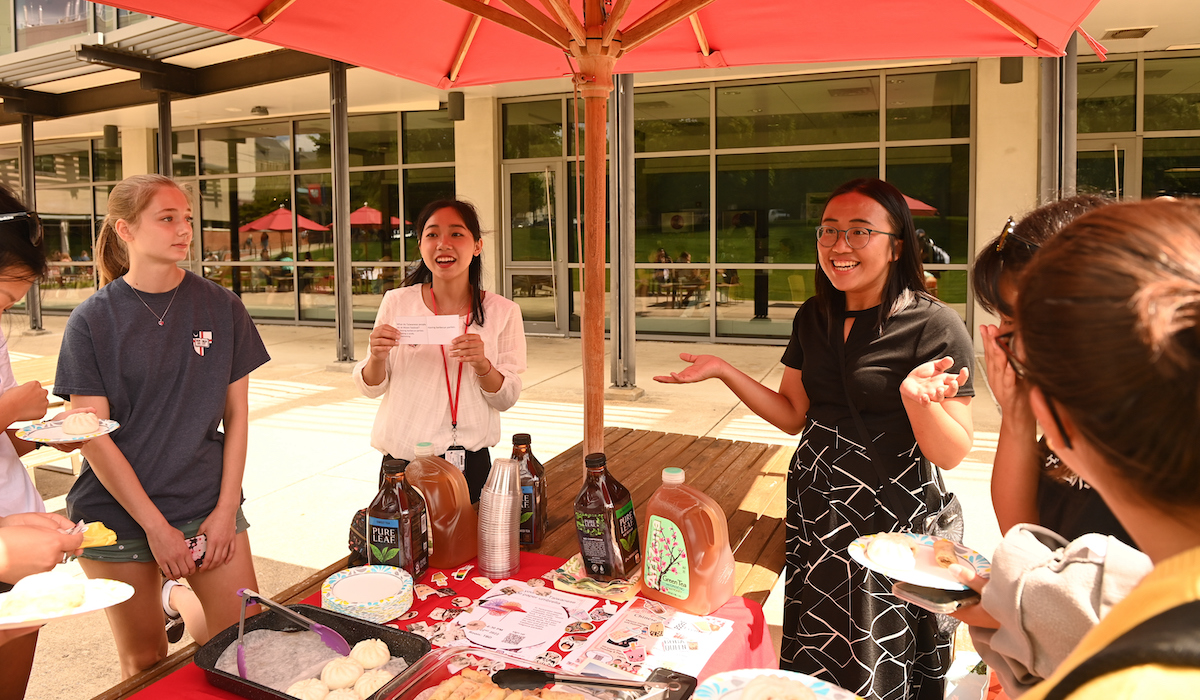

Students who visit the office of the new director of the Asian Studies program will likely be greeted with a warm welcome and offered a cup of tea.
Sharing customs from her native Taiwan are all part of the efforts of Yung-Yung Chang, director of Asian Studies, to expand the cultural understanding of students through Asian-focused language and culture classes. Chang, who holds a masters in Chinese pedagogy and is a Ph.D. candidate studying Chinese Linguistics and Computational Linguistics, said offering these experiences on campus is important for personal and professional development, especially since Washington, D.C. is a global city with many embassies and cultural opportunities.
“If you only know your own language, it is hard to have cultural understanding because you interact differently with people of different cultures,” Chang said.
She said breaking down language and cross-cultural barriers is the first step to growing in faith and relational understanding. “We focus on how the Church is not just for America: it’s for the nation and it’s for the whole world,” Chang said. “So I think through learning a language, you are able to reflect your own beliefs and philosophy.”
The Asian studies minor requires students to complete advanced language requirements as well as four electives from two different departments or disciplines.
Beginner and intermediate Mandarin Chinese, both taught by Chang, are the only language courses available in the program but other Asian languages will be provided in the future when teacher assistants or online courses can be supported.
Chang does not expect each of her students to become fluent, but she wants her students to “interact with the language and also have the knowledge of the language and the culture.” Chang also teaches an advanced Mandarin composition and conversation course.
This semester, a drama course focusing on various forms of Asian theater and a theology course on Taoism and Confucianism are offered as program electives. Chang hopes to involve other University departments in providing a wider selection of Asian-focused elective courses.
Around 30 students are in the program, with the majority from the history and architecture departments. Chang said the minor has served previous graduates well in nursing, business and government related fields. Chang hopes to attract more students from business and politics fields where knowledge of a foreign language is beneficial in handling cross-cultural conflicts and negotiations.
Chang added she hopes to show her students that studying foreign languages is about much more than professional opportunities.
“Your life is not just about money; your life is about how to make friends, how to survive, how to form community and have a common good together. I do hope that our courses will help students develop critical thinking and how to cooperate across different cultures.”
Chang’s goal is to expand the learning process outside of the classroom and in the future she plans to offer classes that tie together food, culture and language. This semester Chang plans to bring her students to Asian study-related museums, lectures, and concerts abundant in the Washington, D.C., area.
The program also hosts monthly assemblies where students discuss cultural norms, which can range from discussion on proper tipping practices at restaurants to who should pay for a date. “We have very interesting conversations about this,” Chang said. “We should have more of these conversations in classrooms on campus as well.”
Other activities and events planned throughout the remainder of the semester include a Taiwanese craft event on Sept. 22, lecture series, a scavenger hunt and a Chinese cultural series presented by Chang’s students at the end of the semester.
“I’m very excited because our students are very highly motivated. … What they have is a mission or they have goals in their mind so they know how to use the language to help them to pursue a career,” said Chang.